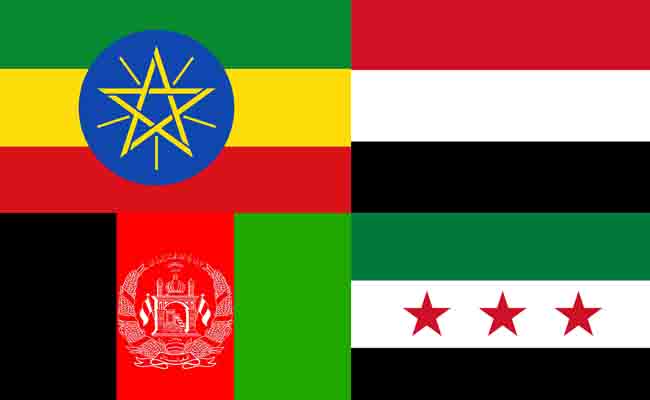In this month’s CrisisWatch yield: a potential turning of the page in Ethiopia; a flicker of hope in Afghanistan; Yemen on knife’s edge; and another (fleeting) opportunity lost in Syria.
The June/July 2018 installment of CrisisWatch features important updates on some of the world’s longest-running conflicts. President Rob Malley finds optimism in Ethiopia and Eritrea; mixed omens in Afghanistan and Yemen; and dashed hope in Syria.
The new Ethiopian prime minister, Abiy Ahmed, continues to make welcome waves, not only domestically – pardoning and releasing opposition members; ending the state of emergency; and promising reform – but also regionally, by moving toward reconciliation with Eritrea and suggesting a thaw with Egypt also could be in the offing.
If Ethiopia illustrates the power of personality in conflict resolution, Afghanistan showcases the power of public opinion: a temporary but historic ceasefire over the Eid al Fitr holiday observed by the government, the U.S. and the Taliban was met with extraordinary scenes of popular celebration, highlighting their eagerness to end the war, as well as eye-popping pictures of Taliban fighters fraternising with Afghan soldiers. The Taliban refused to extend the pause, fighting has resumed, and the grim human toll continues to mount. But the short-lived ceasefire proved that both sides of the conflict enjoy a measure of control over their armed forces and that ordinary citizens constitute a powerful constituency for peace. Both are vital ingredients for any successful peace process.
Developments in Yemen could go in one of two directions. If the Saudi-backed coalition pursues its military objective of seizing the port city of Hodeida, it could both lead to tragic humanitarian consequences and jeopardise any short-term prospect for a resumption of talks. If conversely, the coalition and the rebel Huthis heed the call of the new UN special envoy, Martin Griffiths, and agree to a compromise on the status of Hodeida, it could serve as the springboard for new negotiations to end the war. The track record of all protagonists – internal and external – in this conflict sadly makes the former outcome more likely. But with strong international pressure and support for Griffiths, the latter outcome still remains a realistic, and far preferable, scenario.
Finally, like clockwork, bad news from Syria, where hopes to avert a bloody regime assault on the south-west were quickly dashed. Russia, once again, served as cover for a regime offensive; the U.S., as expected, was more concerned with how to thwart Iran than with how to minimise civilian casualties. All in all, the degree of international jockeying over Syria remains as high as the level of international preoccupation for Syrians remains depressingly low.
Source: Crisis Watch, https://is.gd/JyGboB
